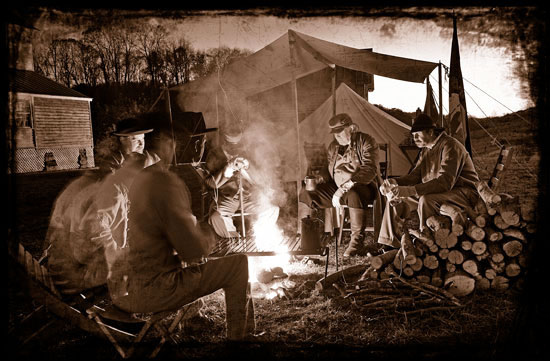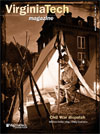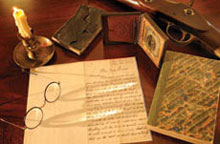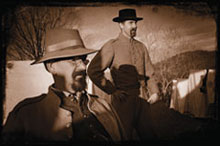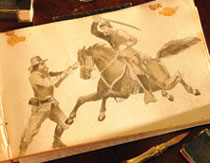 |
|
||||||
|
|
||||||||||||||||||||||||||||||||||||||||||||||||||||||||||||||||||||||||||||||||||||||||||||||||||||||||||||||||||||||||||||||||||||||||||
|
The Civil War: 150 years later
As the sesquicentennial of the beginning of the war approaches, the conflict's relevance hasn't diminished. Even now, the events of the 1860s maintain a strong grip on the nation's collective fascination. "The Civil War lives every day in the American soul and in the fabric of our lives," said Dennis Frye, chief historian at Harpers Ferry National Historical Park, a site that changed hands eight times during the war. Pointing out that attitudes about certain regions of the country are still influenced by perceptions formed during the Civil War, William C. "Jack" Davis, director of programs at the Virginia Center for Civil War Studies (VCCWS) at Virginia Tech, notes that "the Civil War is still with us today." Moreover, as a war that didn't target an external enemy, "It's all ours. It wasn't us against somebody." "There's just very, very little in our life that doesn't have its roots somewhere in the Civil War," said James I. "Bud" Robertson Jr., Virginia Tech Alumni Distinguished Professor in History and executive director of the VCCWS. Robertson, who is helping lead Virginia's sesquicentennial commemoration, believes that "one can never understand what the United States is until one understands what the Civil War was." Forging a nation The outcome of the war "settled" two major issues that nonetheless retain a place in the national conversation today. First and foremost, the war ended slavery. Secondly, the war decided the federal-power-versus-states-rights debate in favor of federal powers, thereby forming a United States that until that time had existed in name only, Robertson said. Decisively, the war put an end to slavery, which eventually led to the civil rights movement that happened in part, appropriately enough, during the Civil War centennial. Slavery, Robertson teaches his students, was unquestionably the primary cause of the war, even if the original goal of the war wasn't to end it. "For 15 years [before the war], every issue to come before Congress [had] something to do directly or indirectly with slavery," he said. Despite the passage of 150 years, racial relations in America remain tinged by the war, Davis said, in part because "we're still dealing with those who are trying to fight the war. There's a current-day agenda that's trying to change history." The contention over states rights, meanwhile, continues unabated 150 years later, Davis said, with arguments addressing issues such as the health care reform bill and environmental regulations. In Virginia, for instance, some voters are lobbying the General Assembly to support a "repeal amendment" that would allow states to veto federal laws and regulations. "The debate is still pretty trenchant," said Davis, who compared today's atmosphere to the 1850s, when extremists on both sides claimed their opinions represented the majority of citizens. "One of the major causes of the war was emotion. We were so young. Half the population back then was under the age of 21 ... and we fought with our mouths," Robertson said. "Now, I'm concerned because we live in an age of negativism. Everything is polarized, or it's politicized." Frye agreed. "We just couldn't settle our differences through conversation and compromise [before the war]. With today's issues, we still struggle to use conversation and compromise to solve our problems." The Civil War also precipitated a number of customs and products so common now that Americans give them little thought: standard time to allow railroads to meet shipping schedules; clothing sizes in small, medium, and large; separate shoes to fit left and right feet; the modern image of Santa Claus; dehydrated vegetables and canned food; women in the fields of teaching and nursing; and the Medal of Honor. Each one's origin can be traced back to the Civil War. Militarily, modern soldiers still learn from engagements such as the Battle of Gettysburg, said Lt. Col. William Stringer, deputy commandant of cadets for the Virginia Tech Corps of Cadets and a speaker at Tech's annual Civil War Weekend. For instance, soldiers in Afghanistan involved in asymmetrical combat—unbalanced forces fighting each other using different tactics—can take lessons from the opening battle at Gettysburg, where an outnumbered cavalry successfully delayed infantry, Stringer said. Experienced commanders also study how a leader 150 years ago made decisions and then apply the lessons to current doctrine. "What happened in Gettysburg in 1863 is very relevant today," Stringer said. "The fundamentals ... are timeless." Education and research In light of the historical and cultural significance of the period leading up to the war, the war itself, and the ensuing emancipation and reconstruction, Virginia Tech and Robertson established the VCCWS in 1999 to facilitate Civil War scholarship and study. Likewise, the expansive Civil War holdings owned by Tech's Special Collections attract researchers and genealogists from all over the country. Produced for the state sesquicentennial commission, an educational two-disc DVD about the war is just one example of the outreach mission of the VCCWS. The contents are geared toward pre-college ages in hopes that young viewers will discover that while "history isn't necessarily going to make life better," it should help people "understand why life is what it is," Davis said. The center's staff, which consists of Davis and Robertson, also has produced an acclaimed guide for educators teaching the Civil War to secondary school students, several books, and a soon-to-be-launched wiki-style website. Graduate students are digitally indexing Civil War newspaper articles by concepts and thoughts, which should improve search results currently confined to keyword-based queries. Digitalization has become another crucial research tool for historians. Digital lists of a library's holdings, for instance, or digital images of actual documents help researchers spend their time more efficiently. "It's revolutionized my research," Davis said. "I've found things that I had missed in every book I wrote." The books in Special Collections number between 7,000 and 8,000, making Tech's Civil War collection among the largest outside of the Library of Congress. The majority of the books were acquired in 1995 when Robertson's friend, Elden E. Josh Billings, ended a 12-year-search for a place to donate his books and several hundred manuscripts by giving them to Tech. Robert Freis (geography '93), of Roanoke, Va., is one of the beneficiaries of the collection. He has taken friends to battlefields since the 1980s and now operates a battlefield-tour business, for which he researches first-person accounts to enrich his narratives. Frequently, he's been "astonished and gratified" to find rare, out-of-print sources at Tech. "I feel as fortunate as any prospector who strikes the mother lode and consistently extracts something of great value," Freis said. As the past continues to shape the present and future, Virginia Tech will continue to play its part in defining precisely why the Civil War holds such a singular grip on the American consciousness. The sesquicentennial comes to Virginia Tech on May 21, 2011, for a conference on military strategy in the war. So many years after the states became fully united, differences still remain, and Robertson and Davis are keeping their fingers crossed. "The 150th should be a time when all Americans, all races, all ages, come together," Robertson said. "We'll do the best we can, and we'll make an impression." |
|
|||||||||||||||||||||||||||||||||||||||||||||||||||||||||||||||||||||||||||||||||||||||||||||||||||||||||||||||||||||||||||||||||||||||||
|
|

